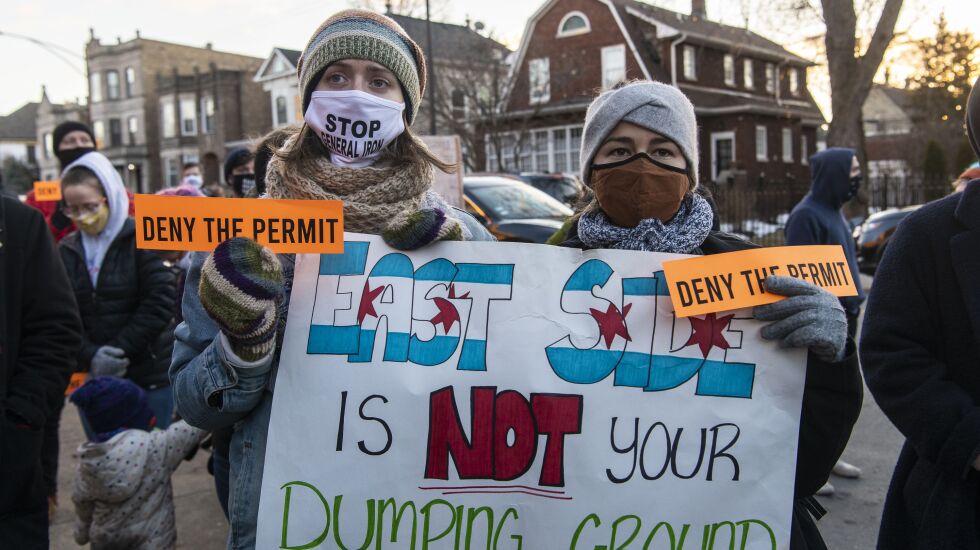
A city administrative judge will decide this spring if a long-contested car-shredding operation on the Southeast Side can open after being blocked by Mayor Lori Lightfoot’s administration almost a year ago.
Weeks of hearings over the permit denial for the relocated and rebuilt General Iron wrapped up Monday.
City lawyers defended the decision made in February 2022, saying Lightfoot-appointed Public Health Commissioner Dr. Allison Arwady acted within her authority to prevent the shredding facility, renamed Southside Recycling, from opening on East 116th Street along the Calumet River. Amid community protests, Arwady cited public health concerns around adding an additional polluter to the area.
Attorneys for Southside Recycling argue that the denial was unlawful and that the city added “made-up” reasons for rejecting the business.
City administrative hearings Judge Mitchell Ex said he expects to decide as early as April whether the decision last year to deny an operating permit for the metal shredder followed the law.
On the final day of hearings Monday, lawyer Jeffrey Rossman questioned Dave Graham, a city health official who heads environmental protection, about the decision to prevent the opening of equipment with new pollution controls even as a similar business, Sims Metal Management in Pilsen, with a history of environmental violations, continues to do business.
The issue of Sims has been raised throughout the process, and it’s not clear whether the argument is going to help the case of Southside Recycling’s owner Reserve Management Group. The judge warned Rossman multiple times in hearings that Sims has limited relevance in making the decision on the Southeast Side operation.
“I’ve heard this testimony. Repeating it is not helpful,” Ex said Monday. “You’re asking the same questions.”
City lawyers said the Sims operation is unrelated to the Reserve Management permit, which was going to open a rebuilt operation under new city rules for large metal-recycling businesses. Sims is operating under old rules but has applied to get a city permit under the new stricter guidelines.
Both General Iron, formerly in Lincoln Park, and Sims have for decades taken in junked cars, appliances and large amounts of other scrap to run the items through shredding equipment and salvage the metal for resale.
The administrative court is narrowly focused on the issue of whether Arwady followed the city rules for considering a business permit. Reserve Management also is seeking damages from the city in Cook County circuit court.
Reserve Management lawyers have also taken issue with a health impact assessment the city conducted as part of its review. Lawyers have said the city rules do not require such a health review, which was designed to look at public health threats.
The hearings have taken some interesting twists, including previously undisclosed internal city documents presented this month that appear to show Arwady’s prepared comments for an announcement of an approval for the Southeast Side shredder.
The documents, which also included other internal city communications, were provided to Reserve Management by Ald. Susan Sadlowski Garza (10th), company lawyers said.
Lawyers for the city said any documents turned over by Garza were prepared before any final decisions, an assertion confirmed by Graham.
Another reason used to deny the permit related to the track record of other businesses operating on Reserve Management’s Southeast Side campus, including smaller scrap metal operations. The company lawyers have argued that the city should not make decisions based on those businesses, which included at least one violation for dust from the property. Also, the city referenced some alleged violations that had no final determinations, lawyers for the company said.
The proposed move of General Iron from its longtime home in Lincoln Park to the Southeast Side, first announced in 2018, created a firestorm of protest from community organizations and environmental groups.
Moving a polluting business with a history of neighbor complaints from mostly white, affluent Lincoln Park to a Latino community surrounded by Black neighborhoods raised concerns about environmental racism and drew federal investigators who concluded that the city’s practices were discriminatory.
The city is negotiating with federal officials over a possible agreement.
Brett Chase’s reporting on the environment and public health is made possible by a grant from The Chicago Community Trust.







